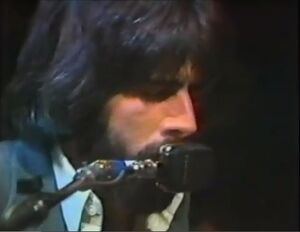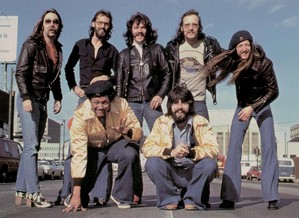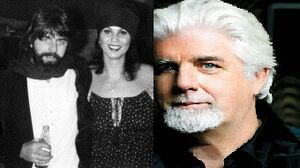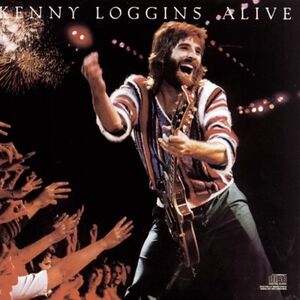Michael McDonald
“But what a fool believes, he sees. The White Man has the Power!”
“Aww hell naw. Ain't no white motherfucka gettin' in here!”
Michael "O'Flannery" McDonald, (August 9th, 1951) also known as America's Greatest Mumbler is a Scottish-born American back-up singer and inventor of the electric piano. McDonald is best known for his especially successful period at the top of the American music charts from the late 1970s until the early 1980s. Beginning his career by singing in the People's Temple Choir as led by notorious gameshow host and pastor Jim Jones, McDonald went on to become the most successful back up singer of all time.
Early Times[edit]
Michael, the son of Timothy O'Shea and Flatterice O'Timins McDonald (both potato farmers of little influence or wealth) grew up in his native Scotland and lived there until the age of supramajority (19 years of age, as recognized by Scottish minor courts). It was in Scotland that McDonald developed his musical "talents" by playing 2nd chair flute in such influential early acts as Count Bassie's Majority Jazz Players and a Hall and Oates cover band, Michael Anthony Hall and Oates.
Steely Dan[edit]
Upon moving to Los Angeles in order to avoid prosecution in his native Scotland, McDonald began testing the musical waters by playing at various piano bars around the greater LA area. It was at one such bar that Steely Dan co-programmer Walter Becker recognized that McDonald had considerable talent for a human being as far as musical ability was concerned. Not wanting to make an immediate decision on whether McDonald was an acceptable 2nd chair flautist without lead Steely Dan programmist Donald Fagen, Walter held off on talking to the young McDonald. This allowed a group of young, upstart gameshow enthusiasts to approach McDonald that very night about singing in their choir. It so happened that these clean, cut youth persons were members of the Los Angeles affiliate of the People's Temple.
Jim Jones and His People's Temple[edit]
McDonald was recruited by PT initiates in April of 1971 and immediately took up flauting and piano playing for the eclectic Jones and his homegrown church's choir. McDonald quickly rose through the ranks of the choir, largely because his backing vocals were just so damn distinctive. A great example of this can be heard on the People's Temple song Ride Like the Wind and it was on the strength of such hit singles that He's Able, the first and only album to come out of the People's Temple Choir, stayed at the top of the Billboard 100 for over a year.
You go back jack and do it again, this time for Steely Dan[edit]
It was at the 43rd Annual Grammy Awards that McDonald was once again spotted by Steely Dan computational specialist Walter Becker, this time in attendance with Donald Fagen, lead computer scientist on the D.A.N. project. McDonald, performing alongside his People's Temple Choir members for the televised broadcast, stood out in a choir comprised largely of elderly black women that resembled Aunt Jemima. The D.A.N. computationalists quickly tracked down McDonald backstage after the performance and invited him to audition for first chair flute/stand-in Wurlitzer player on what would be Steely Dan's next album, We Spent Far Too Many Hours in The Studio for You Not to Care. Seeing his opportunity to escape the increasingly dangerous and detached Jones, McDonald auditioned and was immediately accepted as the newest member of Steely Dan. This move would prove to be one of the biggest blessings of McDonald's life.
The Marijuana Cousins[edit]
Whilst working on Steely Dan's groundbreaking Hit Records Ain't Made Overnight, They Take Years of Research and Planning, McDonald received a phone call from previous Dan member Jeff "Mobile Weapons Platform" Baxter. The lead singer of the popular Marijuana Cousins band had fallen ill with Stockholm syndrome and the group was in dire need of a lead singer. McDonald reluctantly accepted and parted ways with the supercomputer that started his career. In an act of misguided love, the Steely Dan computational machine would later go on to attempt to incite a thermonuclear war with the Soviet Union. Thankfully a young Matthew Broderick, with the aid of Dabney Coleman, shut off the Steely Dan computer for over a decade. Back to the Marijuana Cousins, McDonald was willing to join the group on the condition of a name change.
Feeling that The Marijuana Cousins was too religious and may alienate the band's considerable Pentecostal following, McDonald proposed that the band's name be simplified to The Doobie Brothers. Baxter, along with the other band members whose names are not important enough to recall at this point in time, accepted the name change without question and accepted their new lead singer, Michael McDonald.
Doobie Brothers[edit]
Almost immediately the Doobie Brother's fanbase quadrupled to 16 people and record sales reflected this new positive change. What once was a moderately obscure rock outfit manned by lack-luster studio musicians became one of the top selling acts in the United States. The band's first album with McDonald Down and Out on Azoozle Street had heavy Scottish influence and hearkened back to the boogey-woogey, piano humping musical stylings of Jerry Falwell. The band began their first tour and sold out arenas across the United States, leading to a jealous Richard Nixon to sign an executive order outlawing anything that made people feel good. Fortunately for the United States and the world, Robert Redford and Dustin Hoffman had instated Gerald Ford as president the year before in the first and probably only political coup to ever take place on US soil.
McDonald enjoyed a string of hit songs with the Doobie Brothers, attracting the attention of top record labels such as Warner Brothers. He was approached and asked to become an in-house songist for Warner Brothers while continuing his ground-breaking work with the Doobie Brothers. McDonald, consulting with his beard, agreed to Warner's conditions and starting in 1977 began to work at a break neck pace.
The Greatest Song Ever Sold[edit]
Between 1977 and 1983, McDonald personally wrote, composed, arranged and sang back-up vocals on every song sold commercially in the United States. He quickly achieved Guinness Book of World Records entries, outdoing himself each year until 1983. The stress of constantly creating and churning out thousands of new songs and albums coupled with having to sing back up on every song caused his hair to go from black to Gandalf white in the span of one year. McDonald spoke candidly about this period of his life with Rolling Stone in 1986 stating:
“You know, I just don't have much to say unless its echoing what someone else just sang.”
McDonald quickly over-saturated the already over-saturated US airwaves and his once promising career had spiraled into little more than late-night talk show parody covers and Second City TV knockoffs. Because McDonald was so prolific in his work, he helped launch the careers of virtually every artist to have come from that period in time and is even credited by some political analysts with helping Ronald Reagan oust incumbent Jimmy "Mr. Peanut" Carter by writing the hit Reagan campaign song, Sweet Freedom. McDonald has worked with such noted artists as Christopher Cross, Van Halen, Steely Dan, Jim Jones and His People's Temple Choir, the Doobie Brothers, the Beastie Boys, the Beach Boys, the Hardy Boys, Grover Cleveland, Dionne Warwick, Sissy Spacek, Patrick Swayze, Toto, Michael Jackson, Ermatine Forrester and the Pearls of Great Price, Screamin' Jay Hawkins, Carly Simon, James Ingram, Patti LaBelle and many others, far too numerous to list. If an artist recorded a song between 1977 and 1983, there is a 104% chance that McDonald not only wrote it but has a secret recorded and unreleased copy where he is the lead singer stashed in his basement. Reflecting on that time in his life in the aforementioned Rolling Stone article McDonald stated:
“Hey, c'mon on now! Yeah, yeah, yeah, anytime.”
Because of the incredible stress of constantly writing millions of songs for the secretive cabal at Warner Brothers along with repeated "farewell" tours with the Doobies, McDonald increasingly turned to his native Scottish instinct, drinking himself half-blind in bars around Los Angeles. This would turn out to be a fatal career move.
The Loggins Connection[edit]
It was on one such night in late 1982 that McDonald's ran into young upstart, Kenny Loggins, formerly of the semi-popular folk band Loggins and Messiah. Loggins challenged the elder McDonald to a beard judging contest and the bar unanimously voted for Loggins because his beard lacked the grey weightiness of McDonald's beard. Feeling sorry for himself, McDonald paid his bill and decided to head home but Loggins offered him a "Devil's handshake" (not the sexual position). Intrigued, McDonald sat and listened as Loggins promised to ease the great stress of receiving tens of millions of dollars in royalty checks daily while still allowing McDonald the creative freedom and musical respect he had once enjoyed.
McDonald took Loggins up on his offer and the two started to record and write music together. They would often be seen paling around Los Angeles and appeared on one another's records. For time being, things seemed to be getting better for McDonald with Warner Brothers no longer demanding the insane writing/composing/recording/touring schedule they once had. It seemed that McDonald would finally have the time to enjoy the close to $100 billion fortune he had amassed from music publication royalties.
Cracks in McDonald's career began to show when Loggins approached him in dire need of a theme song for the up and coming teen horror film Foot Loose. McDonald cranked out the now iconic title track in less than 48 hours and Loggins had it recorded by the end of that same week. Upon hearing the song, movie studio executives became ecstatic with one in particular screaming "That's it! This is that new sound we've been looking for!" before doing a line of cocaine off the boardroom table.
Almost immediately after the release of the Foot Loose soundtrack, McDonald saw an almost immediate reduction in demand for his work. Royalty checks began to slowly disappear from his mail stream, eventually stopping altogether. McDonald claims to this day that he never once received any credit or acknowledgement for his work on the Foot Loose soundtrack stating:
“By that point, it wasn't about the money. It was about the lost years, the years wandering through exile in the musical wilderness. I wasn't after money. What I wanted more than anything was the time that had been taken from me and for my hair to return to its natural color.”
But it wasn't meant to be. Demand for McDonald's work was completely non-existent by the summer of 1984. McDonald realized, perhaps a bit too late, he had shaken the Devil's hand. Loggins disappeared, becoming a huge star in his own right, the Doobie Brothers had disbanded and Soul Train refused to allow a white performer, no matter how black he sounded on the show. Even the members of McDonald's original foray into music, The People's Temple Choir were all dead, victims of a mass-murder orchestrated by Jim Jones, Kool-Aid and the makers of Thorazine. McDonald, with no where left to turn, holed up in his house, high in the hills above Los Angeles to think and to plan.
Hiatus and Eventual Return[edit]
Between 1985 and 1993 McDonald released only one recording, a single, 1987's duet with Patti Labelle On My Own. The song rapidly rose through the ranks on the Billboard Hot Jams for Afro-Americans chart proving that McDonald was still in touch with the American public's musical tastes. It would be another six years before McDonald sought out work and it would come from a most unexpected source. In August of 1993, McDonald received a phone call from then in-house Death Row Records producer, Dr. Dre. Dre, needing a "fresh" sound for his newly created strain of G-Funk rap, had tuned into a lite rock pirate radio station broadcasting out of North Compton while driving home from the Death Row studios one evening. I Keep Forgettin', a hit single from McDonald's 1982 solo effort Doing Things The Way I See Fit Without The Interference of Bandmates, came on the station and Dre was so moved he pulled over to weep, fearing that if he were seen with tears in his eyes, Suge Knight would instinctively know and have him murdered in Las Vegas. Thankfully for Dre, Suge was too busy catching Tupac with tears in his eyes to bother with Dre.
Dr. Dre, having been trained at Johns Hopkins University and having received a bachelor's in Funk, knew instantly this was the sound he wanted for the next record that Death Row put out. Dr. Dre tracked down McDonald and tried to convince him to help with any and all future Death Row recordings. McDonald, still reeling from the racism he received at the hands of Don Cornelius and leery of entering into another deal in which the word "all" appeared, was resistant at first. It wasn't until two gentlemen well over 6'5" from Death Row appeared at McDonald's house that McDonald was convinced it was in his, and everyone else's, best interest to work with Death Row Records.
McDonald enjoyed a fruitful tenure at Death Row helping churn out hit after hit, just as he had done many years before hand at Warner Brothers. This success went on until Death Row collapsed after the murder of Tupac Shakur. Some have questioned where McDonald was the night of the murder with some going so far as to suggest he may have been either the trigger man or the getaway driver but this theory has been soundly refuted by McDonald, Suge Knight, Margaret Thatcher, Alexander Isayevich Solzhenitsyn, high ranking members of the DPRK's Workers Party and McDonald's second cousin, Ronald McDonald.
Current Where Abouts and Future Plans[edit]
McDonald is currently retired from music, instead choosing to pursue his first passion, nude sketching. He resides on a farm property outside of the Nashville, Tennessee metro area where he lives with his wife of 30 years and several pets.



